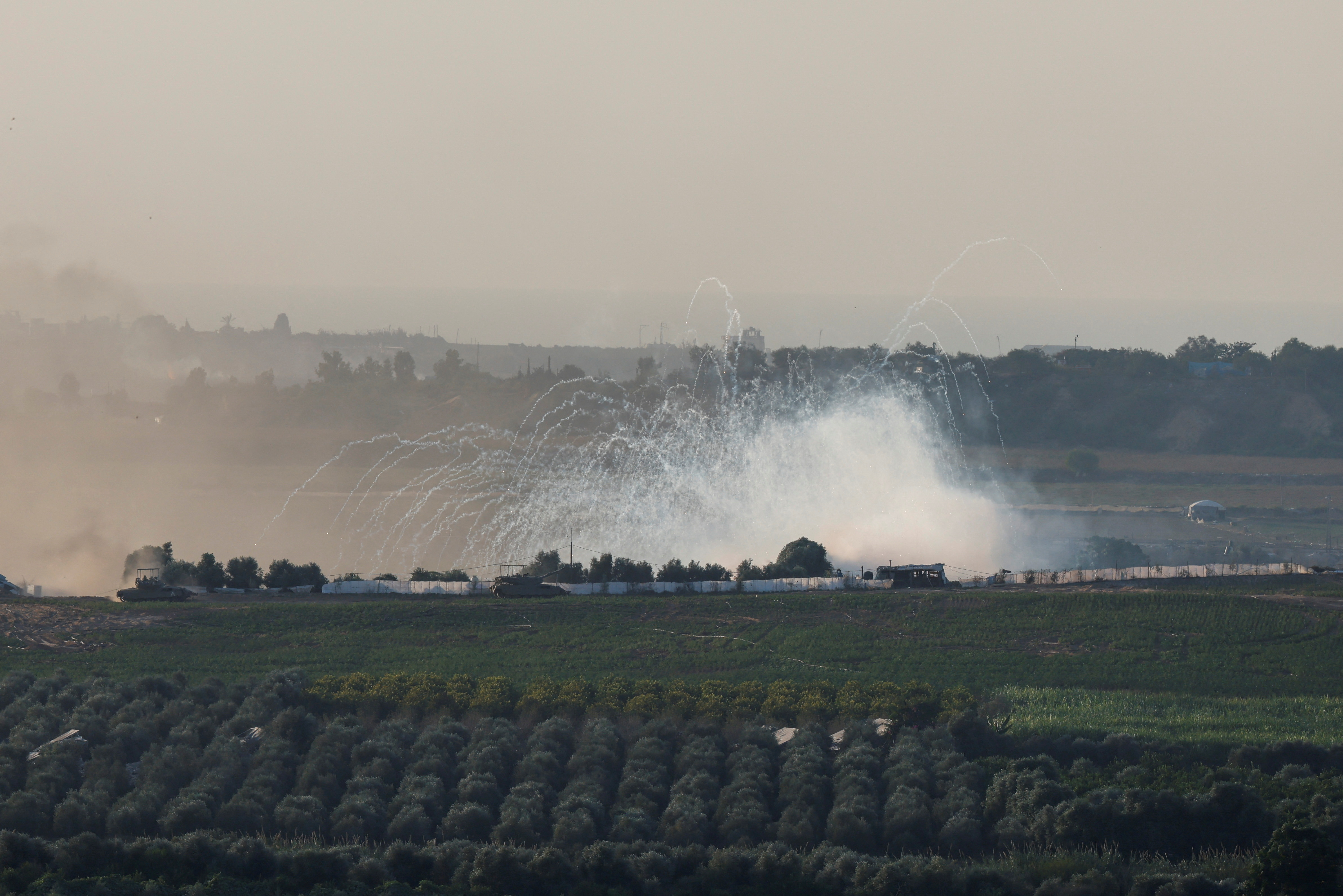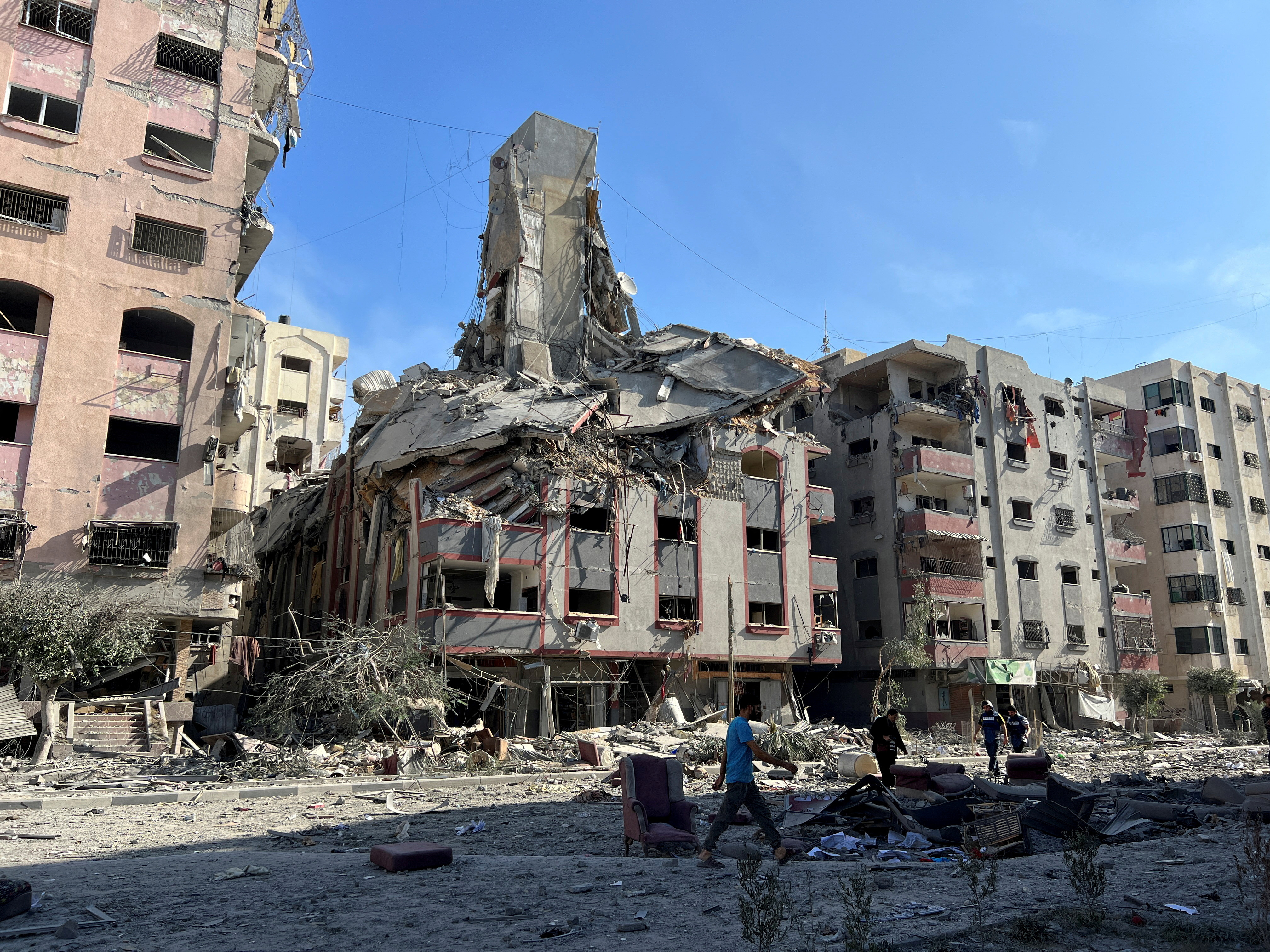Israel said its forces attacked Hamas gunmen inside the militants’ vast tunnel network beneath the Palestinian enclave of Gaza after Prime Minister Benjamin Netanyahu dismissed calls for a halt to fighting to ease a worsening humanitarian crisis.
The tunnels are a prime objective for Israel as it expands ground operations inside Gaza to wipe out Hamas, which rules Gaza, following its deadly surprise attack on southern Israel three weeks ago.
“Over the last day, combined IDF (Israel Defense Forces) struck approximately 300 targets, including anti-tank missile and rocket launch posts below shafts, as well as military compounds inside underground tunnels belonging to the Hamas terrorist organization,” the Israeli military said in a statement.
Militants responded with anti-tank missiles and machine gun fire, it added.
“The soldiers killed terrorists and directed air forces to real-time strikes on targets and terror infrastructure,” the Israeli military said.
Israeli forces also bombed Gaza overnight in air, sea and ground attacks, hitting northwestern areas of the coastal enclave where Israeli troops were operating on the ground, witnesses said on Tuesday.
Witnesses said Israeli forces targeted Gaza’s main north-south road on Monday and attacked Gaza City from two directions. Israel said its troops freed a soldier from Hamas captivity.
The Islamist group has so far released four civilians from the 240 hostages Israel says were captured in the Oct. 7 attacks in which about 1,400 people were killed. Many of the hostages are believed to held in the tunnels.
Gaza health authorities say that 8,306 people, including 3,457 minors, have been killed in Israeli attacks since Oct. 7. U.N. officials say more than 1.4 million of Gaza’s civilian population of about 2.3 million have been made homeless.
Reuters has been unable to independently verify casualty counts.
The al-Qassam Brigades, Hamas’s armed wing, said militants clashed early on Tuesday with Israeli forces invading southern Gaza. Four vehicles were targeted with al-Yassin 105 missiles, it said, referring to locally produced anti-tank missiles.
The militants also fired at two Israeli tanks and bulldozers in northwest Gaza, al-Qassam said. In Beit Hanoun, in the northeast, they “liquidated” an Israeli unit which was ambushed as it entered a building.
Reuters was unable to confirm the reports of fighting. The Israeli military had no immediate comment on the Hamas accounts.
The mounting death toll has drawn calls from the United States, Israel’s main ally, other countries and the U.N. for a pause in fighting to allow more humanitarian aid to reach the beseiged enclave, where food, fuel, drinking water and medicine are all in short supply.
Netanyahu said on Monday that Israel would not agree to a cessation of hostilities and would press ahead with its plans to wipe out Hamas.
“Calls for a ceasefire are calls for Israel to surrender to Hamas, to surrender to terrorism, to surrender to barbarism. That will not happen,” Netanyahu said in televised remarks.
A World Health Organization official in Geneva said on Tuesday that a “public health catastrophe” was imminent in Gaza.
Air strikes on Monday night outside the Indonesian Hospital in the northern Gaza Strip caused a power cut and doctors said they feared for the lives of 250 injured Palestinians being treated there as fuel runs low.
“Running out of fuel would mean no power and no power would mean the inevitable death of many patients at intensive care unit and wounded in surgery departments,” Dr. Moaeen Al-Masri said.
Footage obtained by Reuters showed Palestinians carrying bodies of victims of Israel’s ground offensive on a donkey cart to the Indonesian Hospital. Dozens of Palestinians walked behind the cart and around it chanting “Allahu akbar” (God is Greatest).
Health officials at the Turkish Friendship Hospital in Gaza City also reported that bombing damage to the third floor had endangered the lives of cancer patients.
The U.N. humanitarian office (OCHA) said that water supply through a pipeline from Israel to southern Gaza was cut off on Monday for unknown reasons, and that an announced repair of another pipeline to central Gaza did not take place.
“At the time of writing, no water is provided to Gaza from Israel,” OCHA said.
Significantly fewer humanitarian aid trucks than needed have reached the besieged enclave, U.N. officials said, and civil order has broken down with people storming U.N. warehouses in search of food.
That has put four U.N. aid distribution centres and a storage facility out of action, the U.N. agency for Palestinian refugees (UNRWA) said on Monday.
“It’s a disaster on top of a disaster. Health needs are soaring and our ability to meet those needs is rapidly declining,” WHO regional emergencies chief Rick Brennan said, reiterating international calls for a ceasefire to enable a larger humanitarian operation.
Aid trucks have been trickling into Gaza from Egypt over the past week via Rafah, the main crossing that does not border Israel. It has become the main point of aid delivery since Israel imposed a total siege of Gaza after Oct. 7.
OCHA said 26 trucks entered the Rafah crossing on Monday. Before the conflict, an average of about 450 aid trucks were arriving daily in Gaza.
The conflict has led to demonstrations worldwide in support of the Palestinians, and a rise in antisemitic and Islamophobic harassment.
The U.S. National Muslim Democratic Council said it would work to mobilise millions of Muslim voters to withhold votes towards President Joe Biden’s 2024 reelection unless he takes immediate steps to secure a Gaza ceasefire.
Related Galleries:





The post Israel says it attacked Hamas gunmen inside Gaza tunnels first appeared on The News And Times – thenewsandtimes.com.
